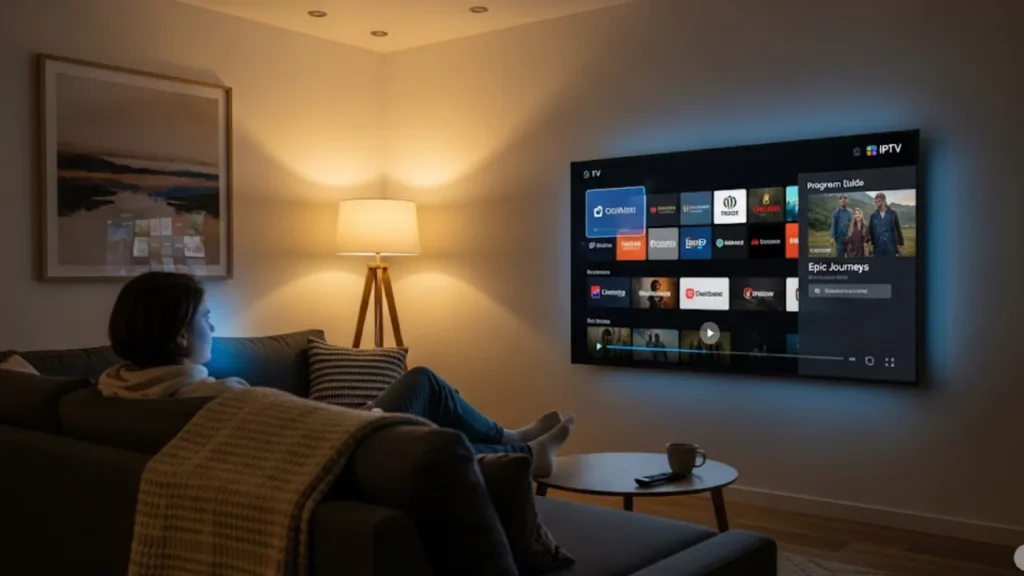Selecting wired or wireless for your IPTV setup can change how you stream. Understanding the performance differences helps you make the right decision for seamless entertainment.
Using Ethernet cables for wired connections boosts IPTV performance. You get reliable speeds, lower latency, and stable connections. Wireless networks are convenient and flexible. But they struggle with issues like network congestion and signal interference. For the best streaming, especially in 4K Ultra HD, use wired networks. They are often better than wireless ones. They offer better reliability and video quality.
What Makes Wired vs Wireless Different?
Wired and wireless networks work differently. This is why your IPTV streaming service acts differently on each one. Wired networks, such as Ethernet, offer a fast and stable connection. They have low interference, making them great for streaming. Wireless networks use Wi-Fi. This can slow down due to distance, obstacles, or other devices. These factors can cause performance problems. These factors directly impact how well your IPTV service works.
The Power of Ethernet Connections
Wired connections use Ethernet cables. They ship records directly out of your router for your streaming devices. These cables, Cat 5e, Cat 6, Cat 6a, and Cat 7, provide clear paths for your IPTV streaming data.
- Direct data transmission eliminates interference from other devices
- Consistent bandwidth ensures stable video quality throughout your viewing session
- Lower packet loss reduces buffering and connection drops
- Dedicated network infrastructure provides reliable performance for live TV
Understanding Wireless Network Technology
Wireless networks rely on radio frequency signals to send data. This connects your wireless router with streaming devices. Wi-Fi standards such as Wi-Fi 5, Wi-Fi 6, and the new Wi-Fi 7 set connection limits.
The convenience of wireless networks comes with trade-offs. Many gadgets percentage bandwidth to your local place community. Physical obstacles can also weaken the signal. Devices like smart-home gadgets and gaming gear can slow your IPTV streaming speed.
How Does Connection Type Affect Performance?
Your internet connection plays a key function on your virtual leisure. It influences both streaming quality and how stable your connection is. A fast, reliable connection means smooth streaming, online gaming, and quick downloads. But slower connections lead to buffering and lag. To stream in 4K, have virtual hangouts, or download large files, you need a great internet service.
Speed and Bandwidth Considerations
- Modern Ethernet cables in wired networks make it easy to access steady gigabit speeds.
- Network congestion impacts wireless connections. This is especially true when your local network is busy.
Your broadband connection is key. But how it reaches your smart TV or set-top box affects performance. Wired networks offer steady speeds. In contrast, wireless networks vary. Their speed depends on how far you are from the access point and any interference.
Latency and Connection Stability

Latency spikes can ruin live TV viewing, especially for sports or news broadcasts. Wired connections minimize these disruptions through direct cable connections. Wireless networks can vary more, especially when many devices use the network at once.
Connection drops plague wireless networks more frequently than wired alternatives. Most IPTV app issues stem from unstable wireless connections, not the streaming service.
What Are the Best Setup Practices?
Upgrading your network is key to better IPTV performance, no matter how you connect. A stable wired Ethernet connection or a good Wi-Fi setup can boost your streaming. A well-set network means smoother playback, less buffering, and a better experience.
Wired Network Optimization
- Use good Ethernet cables that match your speed needs. Cat 6 cables work for most homes.
- Install Ethernet switches to expand wired connections throughout your home
- Connect directly to Gigabit Ethernet ports on your router for maximum performance
- Think about using powerline adapters in rooms where it’s hard to run cables.
Get professional installation at your local electronics store. It facilitates preserve cables neat and boosts performance. Quality networking hardware makes a significant difference in long-term reliability.
Wireless Network Enhancement
- Position your wireless router centrally to minimize signal interference and maximize coverage
- Upgrade to Wi-Fi 6 or Wi-Fi 6E. This will boost performance when you have many devices connected.
Modern mesh systems boost wireless coverage in bigger homes. However, they can make your network setup more complex. Regular firmware updates keep your wireless equipment performing optimally.
Gaming routers can adjust Quality of Service settings. This prioritizes IPTV traffic. As a result, your streaming experience improves, even on busy networks.
Pro Tips for Optimal IPTV Performance
For the best IPTV streaming, pay attention to your connection type and network setup. A wired Ethernet connection offers a more stable and reliable stream than Wi-Fi. Also, optimizing your network settings can help. Enable Quality of Service (QoS) and check your internet speed. This will prevent buffering and improve your viewing quality.
Use the right gear. Media players and streaming devices with Gigabit Ethernet ports provide excellent wired performance. For wireless setups, devices supporting the latest Wi-Fi standards perform better.
Check your internet plan. Your broadband speed should be faster than what you need for quality content. High Definition streaming needs a different bandwidth than 4K UHD content.
Implement Quality of Service: Set up your router to prioritize IPTV traffic. This helps ensure smooth streaming over other activities. This helps maintain consistent video quality during heavy network usage.
Regular maintenance matters: Keep your networking hardware updated with the latest firmware updates. Clean your equipment and check cable connections periodically to maintain optimal performance.
Making the Right Choice for Your Setup
Wired connections and wireless networks both play a role in IPTV streaming setups. However, their performance is different.
Wired networks excel in reliability, speed, consistency, and connection stability. They’re perfect for places where you need steady performance for 4K Ultra HD content and live TV.
Wireless networks provide flexibility for mobile viewing and temporary setups. They encounter challenges such as network congestion and signal interference. Still, with proper setup, they can perform well in most viewing situations.
Your decision should balance performance needs with practical installation considerations. Decide on wired or wireless IPTV solutions. Think about your content quality needs, viewing habits, and how your home is laid out.
Frequently Asked Questions
1. Is Wi-Fi or Ethernet better for IPTV?
Ethernet is usually better for IPTV. It offers a stable connection and less buffering. In contrast, Wi-Fi can face interference and speed drops.
2. Does Ethernet improve streaming quality?
Ethernet cuts down lag and buffering. This helps keep streaming quality steady, especially for HD and 4K IPTV content.
3. Should I connect my TV via Ethernet or Wi-Fi?
If possible, use Ethernet for IPTV since it offers more reliability. Wi-Fi is handy, but it can have trouble with high-resolution streams if the signal is weak.
4. Is wired or wireless better for streaming?
Wired (Ethernet) is best for streaming IPTV because it’s stable and fast. Wireless works for casual viewing if your Wi-Fi is strong.
5. Which is safer, wired or wireless internet?
Wired internet is safer than Wi-Fi. It’s harder to hack. Wi-Fi can be vulnerable if not secured well.


